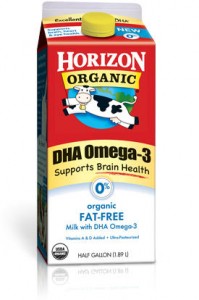
For many who have recently transitioned to eating organic food (and even for many who have been eating organic for years), it can seem like an easy change…just buy products that are labeled “Organic”. Sad to say but today not all organics are really what many of us, myself included, would consider organic in the true sense of the word.
Most of these “quasi-organic” products come from companies that once may have been organic in theory and in fact but are now owned by major industrial food suppliers like Dean Foods, M&M Mars, and General Mills-not quite the quant little farm you imagined from the label. If you want to see how knowledgable you are about the food that you are buying here is an earlier post with a test, brought to us from Planet Green, of who owns what brands…you may be surprised who actually owns some of the most popular organic brands.
One area where there is much controversy surrounding organics is milk, and this heated up in January when GMO-alfalfa was approved by Tom Vilsack, the head of the Department of Agriculture. The potential for cross-contamination of organically grown alfalfa is greatly increased since this was passed and the consequences could be huge for organically fed cows.
Beyond the GMO controversy, which is something more citizens need to become aware of (did you know that GMO crops use more pesticides because they have been genetically altered to withstand more spraying while the surrounding weeds and insects are killed) there is also the issue of what is truly organic. This article from Tom Philpott at Grist about Horizon brand milk, owned by Dean Foods and the largest selling brand of organic milk in the US, and their use of synthetic DHA in what is labeled organic is right to the point about the differences in organics.
Synthetic additives have no business in anything labeled organic and in fact the USDA “recently acknowledged that it was “incorrect” to allow synthetic DHA in organic products in the first place”. But such products still carry the USDA organic label. When cows graze on grass they naturally have healthier fats including the Omega-3’s that Dean is adding in synthetic form. So much of today’s food is just messing with what nature has provided for centuries and instead uses chemical additives that are being shown to be harmful to humans and animals as well (over 70% of all antibiotics in the US are used on farm animals, and that means you are getting the antibiotics when you eat those animals). It’s time to get back to food as nature makes it not mega food corporations, that don’t really care about your health just your shopping dollars.
Our food supply is something that is necessary for our survival and in fact beyond mere survival, for us to flourish as human beings and not be hampered by recurring and chronic illness. What many in the food industry have done is replace good, healthy, natural food with more and more synthetic compounds that our bodies are not meant to ingest. It is no coincidence that since the widespread introduction in our food supply of industrially grown, pesticide sprayed and synthetically created compounds health problems have sky rocketed in the US, not to mention health care costs.
Many have thought that anything labeled organic would protect them, however with the USDA’s labeling and bowing down to corporate interests not all organics are really organic anymore. Here is another post that can help in making more informed decisions when you shop, and more on Dean Foods, they also own Silk soy milk.
So while switching to organic can be a tremendous benefit to your health we all could be a little bit more attentive when we shop rather than just picking up anything labeled organic. Unfortunately government standardization of organics diluted rather than strengthened what organic really means.